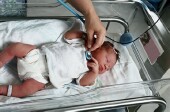- The Best Time of Day to Drink Bone Broth to Maximize Health Benefits
- 8 Ways to Increase Dopamine Naturally
- 7 Best Breads for Maintaining Stable Blood Sugar
- Gelatin vs. Collagen: Which is Best for Skin, Nails, and Joints?
- The Long-Term Effects of Daily Turmeric Supplements on Liver Health
- Could Your Grocery Store Meat Be Causing Recurring UTIs?
- Are You Making This Expensive Thermostat Error This Winter?
- Recognizing the Signs of Hypothyroidism
- 10 Strategies to Overcome Insomnia
- Could Artificial Sweeteners Be Aging the Brain Faster?
Study Finds Steroids May Not Be Helpful After Infant Liver Surgery


High doses of steroids may not benefit infants who’ve had surgery for a serious liver disease, and the drugs may even cause harm, according to a new study.
The findings offer new evidence in a controversy over whether steroid treatment in addition to surgery helps infants with a liver disease called biliary atresia. This condition is the leading reason for liver transplants in children, according to the study authors.
“The results from this clinical trial differ from previous reports of a benefit from steroid therapy on bile drainage or survival in biliary atresia,” co-lead investigator Dr. Jorge Bezerra, from Cincinnati Children’s Hospital Medical Center, said in a news release from the hospital.
“Although we cannot exclude some small potential benefit from steroid treatment, we observed no statistical differences in two-year survival between patients receiving steroid treatment after surgery and those receiving placebo,” Bezerra said. “Children receiving steroids during the study also developed serious adverse events more quickly, raising a potential increase in risks associated with steroid therapy.”
Biliary atresia destroys bile ducts in the liver. This causes bile, a digestive fluid, to become trapped in the liver. That leads to liver cell damage and severe scarring of the liver. Treatment for the disease includes removal of the damaged bile ducts and gallbladder.
The study included 140 infants with biliary atresia from 14 different medical centers. The average age of the babies was 2.3 months. Half of the babies were given steroids when they underwent surgery. The other half received a placebo and surgery.
Six months after surgery, the rates of bile drainage between the two groups were not significantly different. The group treated with steroids after surgery had a 58.6 percent improvement in bile drainage. Those in a control group who received a placebo instead saw a 48.6 percent improvement.
Survival rates at two years were 58.7 percent for those who received steroids and 59.4 percent for those in the control group.
Serious complications occurred in 81.4 percent of those who received steroids and 80 percent of those in the control group. The complications were more likely to occur within 30 days among infants who received steroids (37.2 percent) than among those in the control group (19 percent).
Serious complications included a weakened immune system, increased risk of infection, poor wound healing, gastrointestinal bleeding, poor growth, high blood sugar and a poor response to routine immunizations.
The study was to be presented Saturday at the annual meeting of the Pediatric Academic Societies. It is also scheduled to be published in the May 7 issue of the Journal of the American Medical Association.
More information
The U.S. National Library of Medicine has more about biliary atresia.
Source: HealthDay
Copyright © 2026 HealthDay. All rights reserved.










